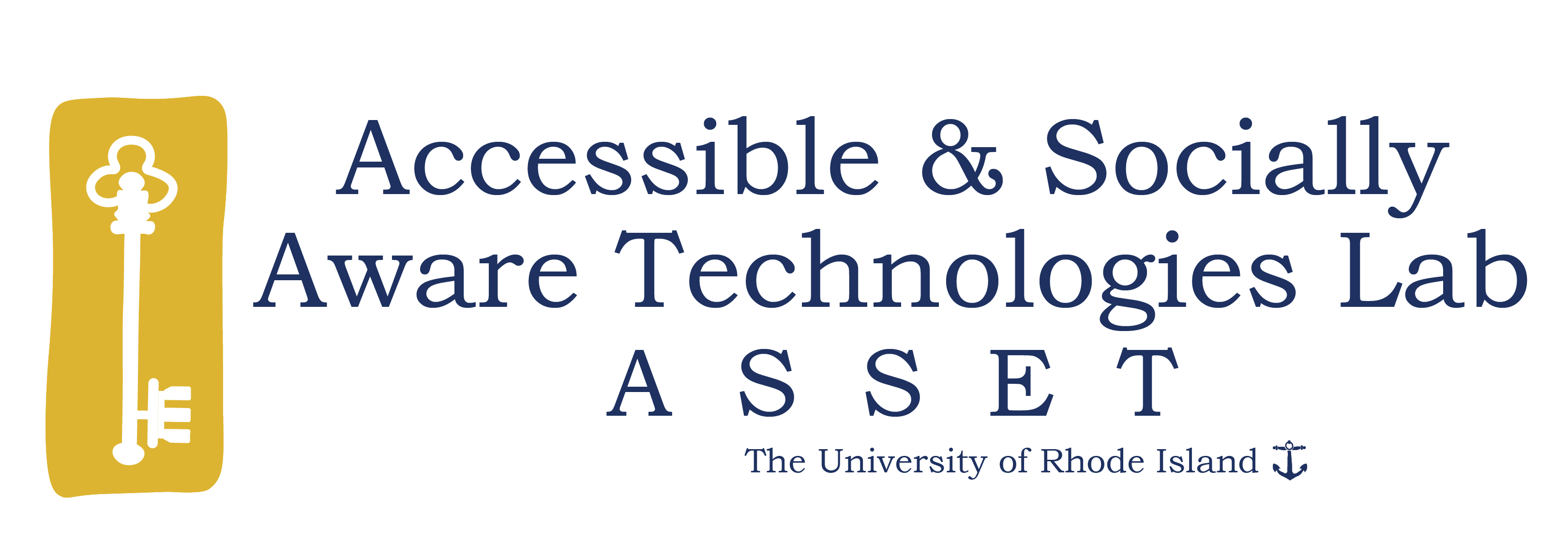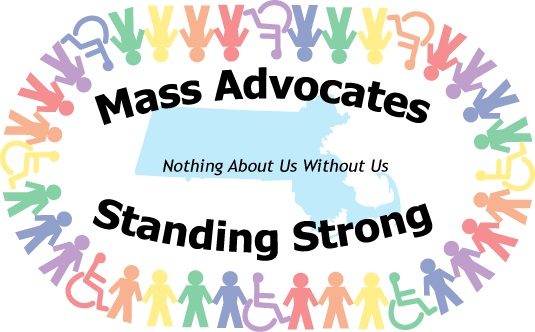
Current Research Projects
Designing Virtual Reality Technologies for Post-Trauma Self Regulation for People with Intellectual and Developmental Disabilities
The US has over 7 million individuals with intellectual and developmental disabilities (I/DD). I/DD are a set of disabilities that negatively affect an individual's ability to learn, reason, solve problems, and learn social or life skills. Examples of I/DD include Down Syndrome, Williams Syndrome, and Autism. A significant number of people with I/DD have experienced trauma at some point in their lives, which can cause them to experience a lot of negative side effects, such as depression, grief, and anxiety; further, these feelings might be triggered during everyday life events. This means that people with I/DD need therapy or other help to deal with their trauma. However, there are not enough therapists who are trained to help this community. The research for this project will design virtual reality (VR) worlds that help traumatized adults with I/DD to help themselves. Ideas that will come out of this research have the potential to develop coping approaches for everyone, including people without I/DD, by creating readily accessible VR-based tools for self-regulation. This is new project funded by the National Science Foundation (NSF) Human-Centered Computing (HCC) program.
Pertinent Publications
- P. Kirupaharan, T-M. Ranalli, and K. Venkatasubramanian. "Understanding the Accessibility of Single-User Virtual Reality Environments for Adults with Intellectual and Developmental Disabilities," ACM Designing Interactive Systems Conference (DIS '25), Funchal, Madeira, July 2025. [pdf] (Accepted for publication)
- K. Venkatasubramanian, T-M. Ranalli, P. Kirupaharan, and Liam Cannon. "Considering Trauma in Accessible Design for People with Intellectual and Developmental Disabilities," Communications of the ACM (CACM), vol. 68 (1) )January 2025 [pdf]
Research featured in
URI Rhody TodayNovel Authentication Methods for People with Upper Extremity Impairments
Over 20 million people in the US alone have conditions that lead to upper extremity impiarements (UEI) of some form. Authentication solutions are usually designed with abled-bodied persons in mind. However, this focus on the able-bodied leaves the authentication solutions deficient when it comes to people with disabilities, particularly for those with upper extremity impairments. A person with UEI is someone without intellectual disabilities who lacks range of motion, strength, endurance, speed, and/or accuracy, associated with movement in the shoulders, upper arms, forearms, hands, and/or fingers. This project is funded by the National Science Foundation (NSF) Security and Trustworthy Computing (SaTC) program .
Pertinent Publications
- B. Lewis, P. Kirupaharan, T-M. Ranalli, and K. Venkatasubramanian. "A3C: An Image-Association-Based Computing Device Authentication Framework for People with Upper Extremity Impairments," ACM Transactions of Accessible Computing (TACCESS), 17(2), 1–37, May 2024 [pdf]
- Brittany Lewis, Tina-Marie Ranalli, Alex Gourley, Piriyankan Kirupaharan, and Krishna Venkatasubramanian. "'I... caught a person casing my house... and scared him off:' The use of security-focused smart home devices by people with disabilities," In Proceedings of the 2023 CHI Conference on Human Factors in Computing Systems (CHI ’23), Hamburg, Germany, April 2023. [pdf] ACM CHI 2023 Honorable Mention Award (Top 5%)
- B. Lewis, P. Courtemanche, K. Venkatasubramanian, “'Sometimes I feel that I’m being left behind': Exploring Computing Device Use by People with Upper Extremity Impairment During the COVID-19 Pandemic,” In Proceedings of the ACM CHI Conference on Human Factors in Computing Systems Late Breaking Work (CHI '22), New Orleans, LA. April-May 2022. [pdf]
- B. Lewis and K. Venkatasubramanian. “I... Got my Nose-Print. But it Wasn’t Accurate: How People with Upper Extremity Impairment Authenticate on their Personal Computing Devices.” In Proceedings of the ACM CHI Conference on Human Factors in Computing Systems (CHI '21), Yokohama, Japan. May 2021. (Virtual Event) [pdf]
- Brittany Lewis, Joshua Hebert, Krishna Venkatasubramanian, Matthew Provost, Kelly Charlebois, "A New Authentication Approach for People with Upper Extremity Impairment." SPT-IoT 2020: 4th IEEE PERCOM Workshop on Security Privacy and Trust in the Internet of Things (Percom-Workshops '20), March 2020. [pdf]
- Cynthia E. Rogers, Alexander W. Witt, Alexander D. Solomon, and Krishna K. Venkatasubramanian, “An approach for user identification for head-mounted displays.” In Proceedings of the 19th International Symposium on Wearable Computers (ISWC '15), Osaka, Japan, September, 2015. [pdf]
Collaborators/Partners


Research featured in
The Boston Globe, URI Today, and URI Arts and SciencesWearable Biosensor-Based Opioid Abuse Treatment Management
According to the CDC, from 1999 to 2016, more than 630,000 people have died from a drug overdose, with on average 115 people dying from opioid overdose daily. A major focus of such preventive efforts has been treatment programs for opioid addiction. One such treatment is called medication-assisted treatment, where prescription opioids that produce less impairment are used to decrease craving and withdrawal while allowing the patient to function in their daily lives. However, success of medication-assisted treatment can by limited by patient non-adherence with the medication, which can lead to relapse to drug use, overdose, and death. In this project we aim to develop technological methods, using wearable physiological sensors, to detect a patient’s non-adherence to such treatment medication using wearable sensors. This project is funded as a NIBIB R01 grant from the National Institutes of Health (NIH) .
Pertinent Publications
- S. Veeturi, V. Ravichandran, A. Cerullo, S. Chomal, Y. Shahriari, K. Venkatasubramanian, S.Carreiro, D. Solanki, K. Mankodiya "Evaluating Dry Electrodes and Bioinstrumentation for Wearable Arm ECG Acquisition," International Conference on the Challenges, Opportunities, Innovations and Applications in Electronic Textile (E-Textiles '24), Berlin, Germany, November 2024 [pdf]
- K. Venkatasubramanian, J. Appleton, T-M. Ranalli, D. Solanki, K. Mankodiya, and S. Carreiro . "Leveraging Trauma Informed Care for Digital Health Intervention Development in Opioid Use Disorder," Journal of Medical Toxicology (JMT), October 2024 [pdf]
- R. Kulman, K. Venkatasubramanian, B. Chapman, and S. Carreiro. “Identifying opioid withdrawal using wearable biosensors.” In 54th Hawaii International Conference on System Science (HICSS '21), January 2021, [Virtual]. [pdf][PubMed]
- R. Singh, B. Lewis, B. Chapman, S. Carreiro, K. K. Venkatasubramanian, "An Approach for Deliberate Non-Adherence Detection during Opioid Abuse Surveillance by a Wearable Biosensor," 12th International Conference on Health Informatics (HealthInf '19), Prague, Czech Republic, February 2019.
- H. Cai, K. K. Venkatasubramanian. “Patient Identity Verification based on Physiological Signal Fusion,” 2017 Second IEEE International Workshop on Security, Privacy, and Trust- worthiness in Medical Cyber-Physical Systems (MedPST), held in conjunction with IEEE/ACM CHASE 2017, pages 1–6, Philadelphia, PA, July 2017. [pdf]
- H. Cai and K. K. Venkatasubramanian. Fusion of electrocardiogram and arterial blood pressure signals for authentication in wearable medical systems. In IEEE International Conference Computer and Networked Systems (CNS) Workshops. Workshop on Cyber Physical Systems Security (CPS-Sec), October 2016. [pdf]
Collaborators/Partners

Research featured in
URI Rhody Today, Rhode Island Medical JournalImproving Prophylaxis Adherence using Digital Phenotyping
In this new project we will be doing innovative work in digital phenotyping to develop SmartSteps, a translatable model to deliver antecedent adherence interventions in anticipation of PrEP nonadherence. The proposed work consists of two phases. First, we will develop SmartSteps by adding context- awareness to DPS adherence data using digital phenotyping. This phenotyping dataset will then be used to generate the algorithmic component of SmartSteps which will anticipate potential nonadherence and deliver corrective feedback before a potential nonadherence events. This work is lead by Dr. Peter Chai from Brigham and Women's Hospital and Harvard Medical School and is a collaborative with Brigham and Women's Hospital, Fenway Health. This project is funded by a subaward from Brigham and Women's Hospital based on a National Institutes of Health (NIH) grant.
Pertinent Publications
- J. S. Lee, E. Browning J. Hokayem, H. Albrechta, G. Goodman, K. Venkatasubramanian, A. Dumas, S. Carreiro, C. O’Cleirigh, P. R. Chai, P. R. "Smartphone and Wearable Device-based Digital Phenotyping to Understand Substance use and its Syndemics," Journal of Medical Toxicology (JMT), 2(20): 205-214, April 2024 [pdf]
- H. Albrechta, G. R. Goodman, E. Oginni, Y. Mohamed, K. Venkatasubramanian, A. Dumas, S. Carreiro, J. S. Lee, T. R. Glynn, C. O'Cleirigh, K. H. Mayer C. B. Fisher. "Acceptance of Digital Phenotyping Linked to a Digital Pill System to Measure PrEP Adherence Among Men who have Sex with Men with Substance Use," PLOS Digital Health (PLOS DH), 3(2): 1-14, February 2024 [pdf]
- T. R. Glynn, S. Khanna, M. A. Hasdianda, J. Tom, K. Ventakasubramanian, A. Dumas, C. O'Cleirigh, C. E. Goldfine, P. Chai. "Informing Acceptability and Feasibility of Digital Phenotyping for Personalized HIV Prevention Among Marginalized Populations Presenting to the Emergency Department," 56th Annual Hawaii International Conference on System Sciences (HICSS '24), O'ahu, HI, January 2024 [pdf]
Collaborators/Partners


Past Research Projects
R3: Ensuring Safety for Adults with Intellectual Disabilities
Violence against adults with intellectual/developmental disabilities (I/DD) is a frequently unrecognized and under-reported problem that has reached epidemic proportions in the United States. The risk of being physically or sexually assaulted for adults with developmental disabilities is four to ten times higher as compared to other adults. There are two main reasons for this dire situation: (1) education regarding what constitutes abuse, especially among people with I/DD, remains inadequate, and (2) the reporting of abuse is difficult, which means people being abused have to rely on good samaritans and designated reporters to report abuse, often well after the fact. With the recent explosion of personal computing devices in the forms of smartphones and wearables, we are at the cusp of a revolution in improving education, proactive alerting, and after-the-fact reporting of abuse committed against adults with disabilities. One of the principal aims of this project is the development of the R3: Recognize, Report, Respond system, which teaches adults with I/DD about abuse and makes it easy for them to report abuse for themselves and those around them. This project is funded by the Massachusetts Disabled Persons Protection Commission (MA-DPPC).
This project has resulted in an app for adults with I/DD to recognize, report, and respond to abuse. It can be found on the Apple app store and the Amazon app store
Pertinent Publications
- Krishna Venkatasubramanian, Tina-Marie Ranalli, Jack Lanoie, Alex Sinapi, Andrew Laraw Lama, Jeanine Skorinko, Mariah Freark, and Nancy Alterio. "The Design and Prototyping of an App to Teach Adults with Intellectual and Developmental Disabilities to Empower Them Against Abuse". ACM Transactions Accessible Computing (TACCESS), 16(2): 1-31, June 2023 [pdf]
- K. Venkatasubramanian, J. Skorinko, N. Jutras, N. Carvajal Erker, L. Padir. “Exploring the Requirements of Abuse Reporting for Persons with Intellectual and Developmental Disabilities”. (Poster). In Proceedings of the 23rd International ACM SIGACCESS Conference on Computers and Accessibility (ASSETS '21), October 2021. (Virtual Event) [pdf]
- T. Howard III, K. Venkatasubramanian, J. Skorinko, P. Bosma, J. Mullaly, B. Kelly, D. Lloyd, M. Wishart, E. Alves, N. Jutras, M. Freark, and N. Alterio. “Designing an App to Help Individuals with Intellectual and Developmental Disabilities to Recognize Abuse”. In Proceedings of the 23rd International ACM SIGACCESS Conference on Computers and Accessibility (ASSETS '21), October 2021. (Virtual Event) [pdf]
- K. Venkatasubramanian, J. Skorinko, M. Kobeissi, B. Lewis, N. Jutras, P. Bosma, J. Mullaly, B. Kelly, D. Lloyd, M. Freark, and N. Alterio. “Exploring A Reporting Tool to Empower Individuals with Intellectual and Developmental Disabilities to Self-Report Abuse”. In Proceedings of the ACM CHI Conference on Human Factors in Computing Systems (CHI '21), Yokohama, Japan. May 2021. (Virtual Event) [pdf] ACM CHI 2021 Honorable Mention Award (Top 5%)
Collaborators/Partners



Research featured in
Boston Globe, Boston Herald, Providence Business News , and URI Today - 2020WPRI12, Boston Globe, Providence Business News, Rhody Today - 2023
Technology to Facilitate Dyadic Peer Support and Autonomous Self Care for People with Intellectual and Developmental Disabilities Post-Trauma
Trauma is a sudden, potentially deadly experience that often leaves lasting, troubling memories. In the US, a significant number of people with intellectual and developmental disabilities (I/DD)1 are suspected to have experienced trauma in their lifetime. The negative effects of trauma (e.g., anxiety, depression, complicated grief) experienced by people with I/DD are often misdiagnosed because of what is known as diagnostic overshadowing, where health practitioners assume that the negative effects of trauma are merely an aspect of the person’s I/DD and/or other disability. Therefore, the majority of people with I/DD who experience trauma may not get appropriate help to cope with the negative effects of the trauma and to improve their quality of life. In this project, we aim to design a system to support dyadic peer-support for people with intellectual and developmental disabilities (I/DD) to cope post trauma.This project is funded by the Massachusetts Disabled Persons Protection Commission (MA-DPPC).
Pertinent Publications
- K. Venkatasubramanian, T-M. Ranalli "Leveraging Technology for Post-Abuse Peer Support for People with Intellectual and Developmental Disabilities." ACM CHI Conference on Human Factors in Computing Systems Late Breaking Work (CHI '24), Honolulu, HI, May 2024. [pdf]
- K. Venkatasubramanian, T-M. Ranalli. “Designing Post-Trauma Self-Regulation Apps for People with Intellectual and Developmental Disabilities.” In Proceedings of the 24th International ACM SIGACCESS Conference on Computers and Accessibility (ASSETS '22), October 2022. Athens, Greece [pdf]
Collaborators/Partners

Developing improved patient monitoring solutions for nurses in neonatal ICUs
NICU nurses taking care of premature babies are constantly juggling several tasks at any given time. This includes monitoring/recording the baby’s vital signs (e.g., ECG, SPO2, and BP), clearing, cleaning, and feeding the babies (often every 2-3 hours), managing any signs of distress in the babies (which can occur at any time), facilitating parent-baby bonding (e.g., Kangaroo care), and training the parents to care for the babies at home. Typically, NICU nurses have multiple (2-3) babies under their care. They are constantly on the move in the process of performing their duties. Currently, the medical monitoring infrastructure is largely wired and can present several hurdles for the nurses, such as: baby distress, bad data, and false alarms. These problems add considerable complexity to the NICU nurses duties given their already busy schedule from managing multiple babies. Our goal in this aim is to understand holistically the challenges faced by nurses and parents, who are an important part of the equation in dealing with sensing technologies around the babies they care for. The result of our work will lead directly to the design of the e-textile-belt for the NICU that will help ease the burden on the nurses and make it easier for the parents to interact with their babies. This work is lead by Dr. Kunal Mankodiya from URI Engineering. This project is funded as an EAGER grant by the National Science Foundation (NSF) Smart and Connected Health program .
Pertinent Publications
- K. Venkatasubramanian, T-M. Ranalli, P. Kirupaharan, D. Solanki, K. Mankodiya ``Understanding the challenges nurses encounter with monitoring technologies in a NICU,'' International Journal of Human-Computer Interaction,” International Journal of Human Computer Interaction (IJHCI), vol. 40 (23) November 2024 [pdf]
- Cay G, Ravichandran V, Saikia MJ, Hoffman L, Laptook A, Padbury J, Salisbury AL, Gitelson-Kahn A, Venkatasubramanian K, Shahriari Y, Mankodiya K. “An E-Textile Respiration Sensing System for NICU Monitoring: Design and Validation.” J Signal Process Systems (JSPS), 2021 Jul 17:1-15. doi: 10.1007/s11265-021-01669-9. [pdf]
Collaborators/Partners
